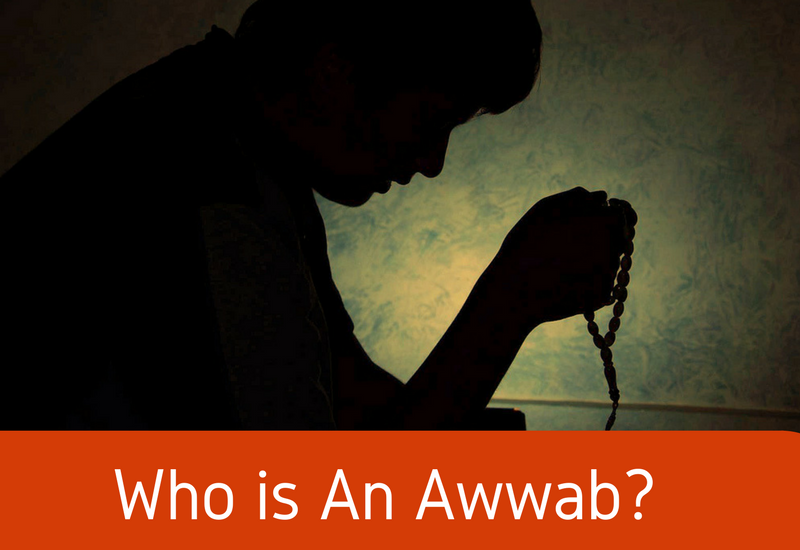Is there anyone among us who does not wish for Paradise and desire to be among its inhabitants? None! The truly perfect world of pleasure, satisfaction and happiness is something we all crave for.
However, Paradise is magnificent and it has a price. It is beautiful and not everyone is fit to be in it; only the beautiful souls shall make it. In the Quran, Allah (swt) guides us to the characteristics a soul needs to possess in order to reach Jannah, and ‘Awwab’ is one of them. Allah (swt) says in Surah Qaf:
“And Paradise will be brought near to the Muttaqun, not far off. (It will be said): “This is what you were promised, – (it is) for those who are awwab (oft-returning to Allah), and those who are Hafeez (those who preserve their covenant with Allah).” (Surah Qaf 50: 31-32)
Who is an Awwab?
According to the Arabic dictionaries, Awwab is someone who repeatedly turns to Allah. It is someone who whenever he sins, keeps returning to Allah in repentance and asks for His forgiveness. It is someone who is not stubborn over his sins. Allah (swt) has promised to forgive such people.
“Your Lord knows best what is in your inner-selves. If you are righteous, then, verily, He is Ever Most Forgiving to those who turn unto Him again and again.” (Surah Isra 17: 25)
An Awwab is someone who keeps turning to Allah in obedience. He keeps coming to him for consultation in every matter of life, be it significant or small; and in every sphere of life, be it private, social or political.
Have you ever seen a small child who is very attached to his mother? The child may be playing at a distance, but he keeps coming to his mother to seek appreciation, to cuddle up to her and to tell her about his little scrapes and achievements. Similar is the case of an Awwab; he keeps turning to the Most Loving Creator.
Have you witnessed how a compass needle cannot stay away from the North for long? When you change its direction, it takes a minute to swerve back to where it belongs – the North Pole. Similarly, the Awwab may sometimes change his direction, he may move away from the straight path, but it does not take him long to realize this and quickly turns back to where he belongs – to Allah!
Examples of Awwabs in the Quran
The Quran not only mentions the characteristic ‘Awwab’ it also presents to us the people who exemplified this quality, so we do not have any trouble adopting it. The Quran tells us the stories of Dawud (as), Sulayman (as) and Ayyub (as) in Surah Sad and praises them as being Awwab.
It is said about Ayyub (as): “Indeed, We found him patient, an excellent servant. Indeed, he was one repeatedly turning back [to Allah.” (Surah Sad 38: 44)
Mentioning Dawud (as) it says: “Be patient over what they say and remember Our servant, Dawud, the possessor of strength; indeed, he was one who repeatedly turned back [to Allah].” (Surah Sad 38: 17)
It is said about Sulayman (as): “And to Dawud We gave Sulayman. An excellent servant, indeed he was one repeatedly turning back [to Allah].” (Surah Sad 38: 30)
Related: How to Deal With Depression in Islam
How to be an Awwab?
Remember Allah at all times:
One of the dilemmas we face as human beings is that we tend to forget Allah in times of happiness. Haven’t you noticed how the quality of our prayer changes with time? In a period of ease, we hardly manage to pray the obligatory Salah; whereas in times of affliction the length and number of our rak’ahs increase dramatically. We even start waking up for Tahajjud!
If we reflect on the lives of the three aforementioned Prophets, we can see that they were all blessed with power, wealth, and many resources. But these blessings did not make them forget Allah. They recognized their benefactor and increased in praise for him. We must follow the example of these Prophets and continue to remember Allah and be obedient to Him throughout our lives.
Always turn to Allah for help:
When we are in need of advice, help, or a material possession, who do we turn to? People or Allah? Of course, as humans, we are a social being and must support each other in order to survive. However, we must first and foremost always turn to Allah for help.
Have you heard the story of a generous king who once told his courtiers that on a particular date I shall give you all whatever you wish for? All the courtiers chose from the great treasures and wealth that lay in front of them. However, one young man walked straight ahead and placed his hand on the king; ‘I want you’. He was wise enough to know if the king were his, everything was his!
So instead of turning to the slaves of Allah why don’t you first turn to their King, who has the power over everything? Let your strongest connection be with the Most Mighty. Look at the examples of the three Prophets who were given the title of Awwab; they continuously turned to Allah and supplicated to Him. In fact, Prophet Muhammad ﷺ has taught us to ask Allah, even if it be for something as insignificant as salt and shoelaces!
Be quick in accepting your mistake and repenting:
It is human to make mistakes, but it is of the doings of Shaitan to be proud of sins and not repent. When Dawud and Sulayman (alayhima asalam) were tested and when they realized they had made a mistake, they did not dwell on it. They repented instantly and turned back to Allah. This is what Allah loves.
Whenever you stray away from the straight path and indulge in a sin, turn back immediately. This is the quality of a believer. Shaitan will try to despair you from Allah’s mercy, thus leading further into the path of sins. Shaitan will make you think, ‘It’s no use going back now’. Pay no heed and turn back. Allah loves those who repent and ask for forgiveness. Allah (swt) says in the Quran, “Verily, those who are Al-Muttaqun, when an impulse touches them from Shaitan (Satan), they remember [Him] and at once they have insight.” (Surah A’raaf 7: 201)
Let’s strive to apply this characteristic in our lives and let’s keep moving towards Jannah; the home of the Awwabs!
>>> Understand the Quran in as little as 10 minutes/day. Click here to learn more
Related Video: Turning Back to Allah – Nouman Ali Khan





Leave a Reply